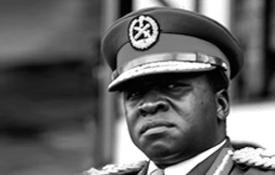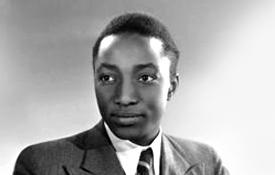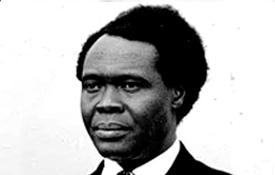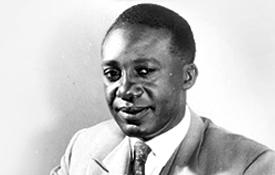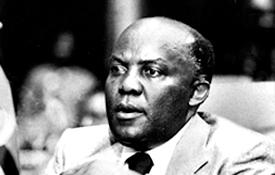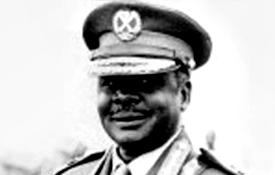Field Marshal Idi Amin Dada was the third President on Independent Uganda, after Fredrick Muteesa II and Milton Obote. Amin, a bulk head figure standing at more than six feet, was no easy President. He shook the world in different ways through his antics and was at one time one of the most ‘feared’ dictators in the world.
There are different accounts about his place of birth. In some accounts, he claimed to have been born at the place where the International Conference Center stands today. Others say he was born in Koboko to a Kakwa father and a Lugbara mother. His actual year of birth is not clear too. It is said that he was born between 1925 and 1928.
Amin’s childhood was a total wreck because he was abandoned by his mother when he was still a baby. He, however survived the street-wise way, selling snacks and doing casual work to earn a living.
In 1946, Amin, who had hobnobbed with soldiers in his early life, courtesy of his mother’s marriage to a Kings African Rifle Clerk, joined the Kings African Rifles. It is not clear whether he joined directly as a soldier; however some sources claim that he was first recruited as a kitchen cook. But soon, he became a real soldier.
It was while with the KAR that the word ‘Dada’ was added to his name because he kept mentioning it whenever he greeted a lady. In between soldiering, he enjoyed different sports activities, including boxing in which he rose to the level of a National Heavy Weight Champion, he tried out athletics as a sprinter and played rugby. He was all the time jolly.
He was a distinguished soldier, easy to pick out from the crowd, largely owing to his actions. During an attack against the Mau-Mau in Kenya, he fought bravely in places like Kinyoma and Kangema in which he killed several of them.
He was promoted to the rank of sergeant in 1955 and he became a Commissioned Officer in 1961. He was deployed as commander of a unit in Karamoja that was supposed to stop cattle rustling in the area.
By the time Uganda got her independence, Idi Amin was one of the leading soldiers who formed the first Uganda independence army. By 1964 he had been named Deputy Army Commander while Shaban Opolot was the Army Commander.
Milton Obote then deployed him to help the Katanga rebels who were fighting against Zaire government. Later, it emerged that Amin had indeed sold gold and diamonds given to him by the rebels in return for arms. Much later, the issue went before parliament for debate; however Obote snuffed it in the bud by arresting all the ring leaders, hence saving himself and Amin.
Having struck a ‘wonderful’ chord, when Obote fell out with Kabaka Fredrick Muteesa, it was Idi Amin, then a Colonel of the army that he turned to for survival. On 24th May 1966, Obote sent a force commanded by Idi Amin to attack the Lubiri in order to bring the Kabaka alive or dead. Amin carried out this order diligently.
While he obeyed his master’s orders to the letter, Amin had his personal ambitions up his sleeve. For example, he was recruiting hundreds of his kinsmen into the army. These were to come in handy later when he decided to take over high office. Among these included Sudanese and Congolese.
By the early 1970s, Amin had created a sizeable force within the Uganda Army that could answer to his whims and Obote recognized this too. A fall out started and finally, it culminated into the 1971 coup. At that time Obote wanted to arrest Idi Amin for various cases including murder. Then, Major General Amin however used his men to stop the move and was soon declared President while Obote was attending a Common Wealth Conference in Singapore.
There was jubilation when Amin captured power, largely because Obote had lost popularity. But soon, it was noticed that Amin was not the savior the country thought he was. Nonetheless, he started off by releasing all political prisoners who had been imprisoned by Obote.
He appointed an all inclusive cabinet, full of professionals and experts-which were hailed by both local and international commentators.
But underneath this all, there was murder going on-especially of Langi soldiers in the Uganda Army. According to various accounts, over 1,000 soldiers from Privates up to the rank of Colonel were murdered in the first days after the coup. Outside the army, the first few years of Amin`s regime saw the murder of several prominent personalities including Ben Kiwanuka (Attorney General).
By 1972, the economy which he had found in a good condition was shriveling. He had already caught up with religious extremism and had shifted from being a ‘darling’ of the Western world – UK, to the East, especially Russia. He claimed to stand for the Palestinian cause and vowed to fight for it.
However, it was his ‘dream’ to chase away the Asians, who hitherto owned most key businesses that shook the world. He gave them just 90 days to leave or perish. Many of them left, others did not, but instead chose to commit suicide. Asian businesses were then distributed amongst his cohorts.
He then embarked on building his army as one of the best in Africa at the time, with fighter planes MIGs from Russia, tanks among others. He was so smitten with his abilities that he threatened to fight the ‘imperialists’ in South-Africa and the Israelis from Palestine.
In 1974, he got an international respite when he held the OAU conference in Kampala. Notable developments at the time included the construction of both Nile Hotel and Nile Mansions to host the conference.
While killings continued unabated, Amin further took his antics to the international level. In 1976, he allowed a high-jacked Air France Plane, bound for Israel to land at Entebbe airport. The Israelis however attacked and rescued their citizens a few days later. His claim on land at the border with Tanzania, and earlier claims of land at the border with Kenya continued.
In 1978, Amin`s soldiers launched an attack on the Kagera Salient in Tanzania and captured it. Little known to Amin, this was the sign that the Tanzanians and various exile groups wanted to get rid of Amin.
By late 1978, they attacked and by April 1979, Amin had been defeated. Amin fled to Libya and later Saudi Arabia where he died on August 16, 2003.
Officially, Amin had five wives, all of whom he treated as ‘First Ladies’ at different functions. They included Kay Amin, Nora Amin, Medina Amin, Sarah Amin and Malyamu Amin. The number of children he fathered is above 30.


